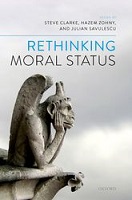Rethinking Moral Status

Contributor(s)
Clarke, Steve (editor)
Zohny, Hazem (editor)
Savulescu, Julian (editor)
Language
EnglishAbstract
Common-sense morality implicitly assumes that reasonably clear distinctions can be drawn between the ‘full’ moral status usually attributed to ordinary adult humans, the partial moral status attributed to non-human animals, and the absence of moral status, usually ascribed to machines and other artefacts. These assumptions were always subject to challenge; but they now come under renewed pressure because there are beings we are now able to create, and beings we may soon be able to create, which blur traditional distinctions between humans, non-human animals, and non-biological beings. Examples are human non-human chimeras, cyborgs, human brain organoids, post-humans, human minds that have been uploaded into computers and onto the internet, and artificial intelligence. It is far from clear what moral status we should attribute to any of these beings. While commonsensical views of moral status have always been questioned, the latest technological developments recast many of the questions and raise additional objections. There are a number of ways we could respond, such as revising our ordinary suppositions about the prerequisites for full moral status. We might also reject the assumption that there is a sharp distinction between full and partial moral status. The present volume provides a forum for philosophical reflection about the usual presuppositions and intuitions about moral status, especially in light of the aforementioned recent and emerging technological advances.
